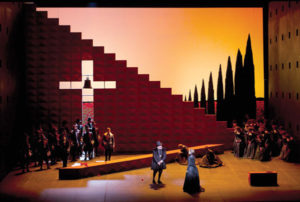
Opera Profile: ‘Don Carlo,’ A Verdi Masterpiece With Numerous Versions
By David SalazarFor many operagoers, “Don Carlo” is Verdi’s most Shakepearean work, pitting a wide-range of powerful characters against one another in an equally complex backdrop of European affairs.
The opera had its world premiere on March 11, 1867 in Paris. However, it was an extremely long opera and was never performed in its entirety during that initial run. Verdi would then make subsequent revisions over the ensuing decades, cutting the opera down to just four acts by excising the first scene of the work. This version had its premiere in 1884 and is widely known as the “Milan” version. In 1886, the composer restored the first Act to the “Milan” version; this one is known as the “Modena” version of the opera and is the most widely performed. Despite the plethora of versions, it remains a major staple of the repertory and is widely considered one of the greatest operas ever created.
Short Plot Summary
Don Carlo of Spain and Elisabetta of Valois meet in the woods in Fontainebleau. They are betrothed and fall in love in their first meeting. However, in the midst of their meeting, a page called Tebaldo arrives to inform Elisabetta that she is to marry Filippo, Carlo’s father. The two are disappointed by the outcome.
The Convent of San Giusto, Carlo meets with Rodrigo and reveals his love for his “mother.” Rodrigo, Carlo’s best friend, tells him that to forget this love, he must request to go off to Flanders and liberate its people. Rodrigo seeks an audience with the Queen and asks her to meet with Carlo. She accepts and while Carlo asks to go to Flanders, he can’t help himself and reveals his love for Elisabetta. Though she loves him, she is forced to rebuff him. Carlo runs off dejected and the King arrives to find his wife alone in the garden. After dismissing one of her ladies-in-waiting, he is confronted by Rodrigo who asks him to consider liberating the people in Flanders. The King ultimately refuses and warns Rodrigo about inciting revolution, as the Inquisition is watching. Nonetheless, the King asks Rodrigo to be his confident and spy on Carlo and Elisabetta, who he suspects are in love.
Carlo receives a letter and heads to the garden thinking he is going to have a rendez-vous with Elisabetta. Instead, he meets with Princess of Eboli, one of the ladies attending to the queen; Eboli is in love with Carlo. When she realizes that he is in love with the queen, she threatens revenge. Rodrigo intervenes in Carlo’s defense, but Eboli seems unfazed. She runs off. Rodrigo asks Carlo to give him any documents that might compromise him.
During the auto-da-fe, Carlo arrives with men from Flanders who beg the King for mercy and freedom. The King refuses and Carlo challenges his father to a duel. Rodrigo intervenes and Carlo is taken away.
The King laments his failure as a father and husband and speaks to the Grand Inquisitor about killing his son. But the Grand Inquisitor wants the King to kill Rodrigo, which the King laments as he would be killing his only friend. Eventually he relents.
The Queen bursts into his chambers after the Grand Inquisitor has left, noting that her box of jewelry has been stolen. The King reveals that he has it and confronts his queen, who faints. Eboli and Rodrigo appear. The two men leave and when alone, Eboli confesses to stealing the Queen’s belongings and also being the King’s lover. Elisabetta sends Eboli into exile; Eboli decides to save Carlo.
Rodrigo seeks out Carlo and is shot in the prison. In an ensuing commotion created by Eboli, Carlo escapes after confronting his father over his friend’s death.
Carlo meets Elisabetta at the Convent of San Giusto. They say their goodbyes as Carlo is headed for Flanders. However, they are interrupted by the King and Grand Inquisitor who are ready to kill them both for treason. However, a monk appears to protect Carlo; many recognize Emperor Charles V, the father of Filippo. The opera ends on this mystery.
Read More on “Don Carlo”
The Opera as a World of Failures
A Look At The Different Versions of “Don Carlo”
Which “Don Carlo” Character Resembles You?
Tenor Russell Thomas Talks About Interpreting the Title Role
Watch and Listen
Here is a performance of the five-act version from “La Scala” starring Plácido Domingo, Elena Obraztsova, Margaret Price, Evgeny Nesterenko, and Renato Bruson.
And here is a recording of the French version of the opera.
And those interested in a four-act version, here is Franco Corelli in the title role.
Categories
Opera Wiki

